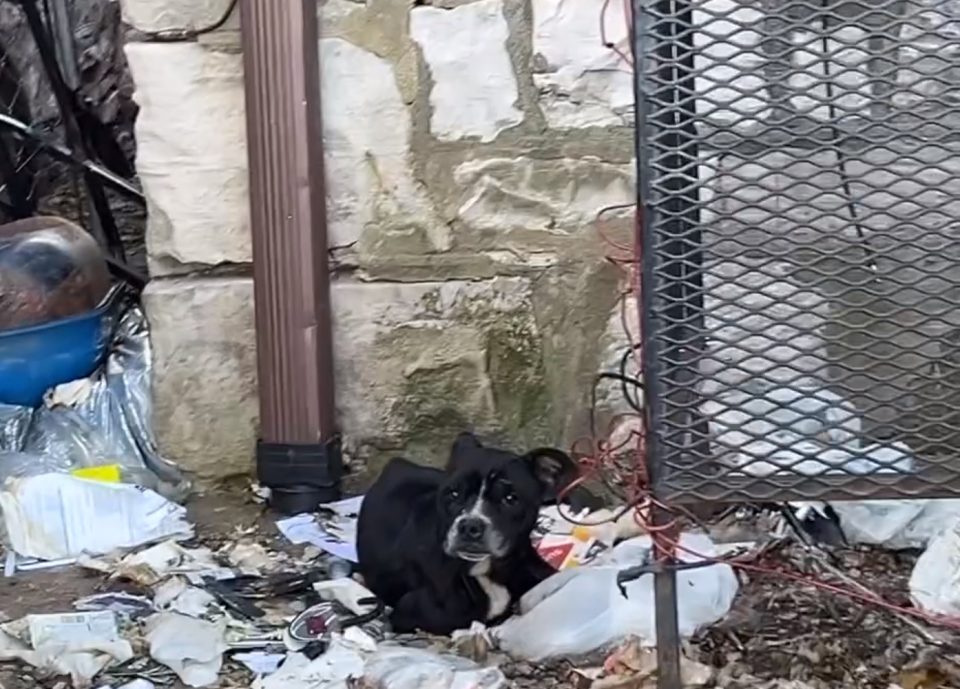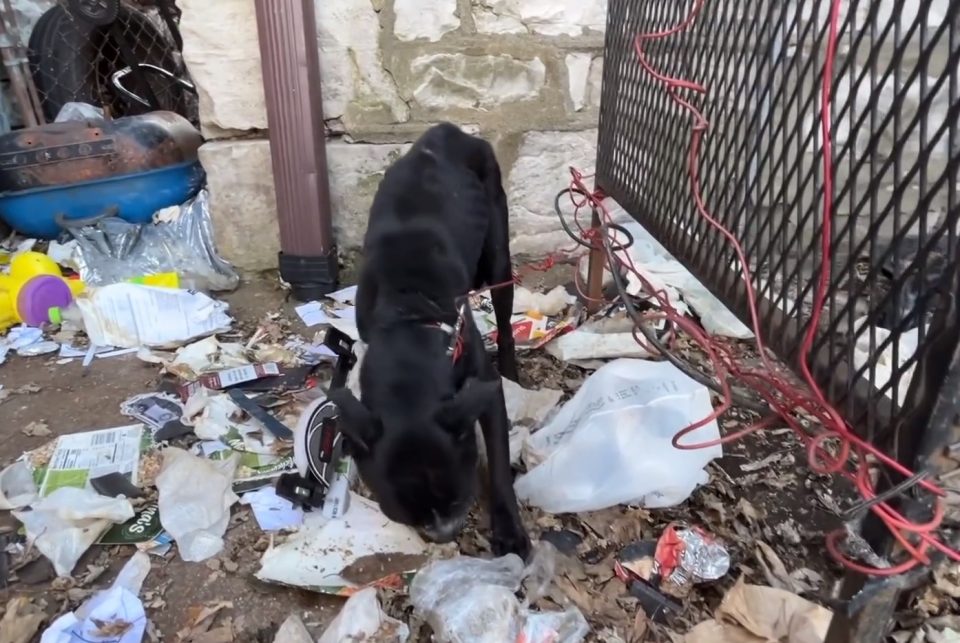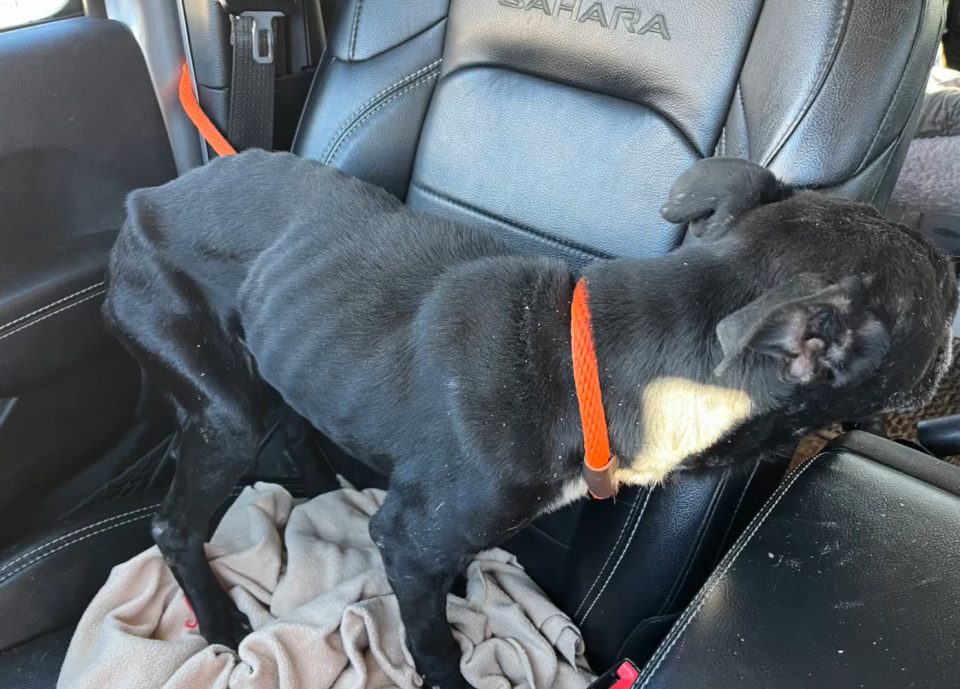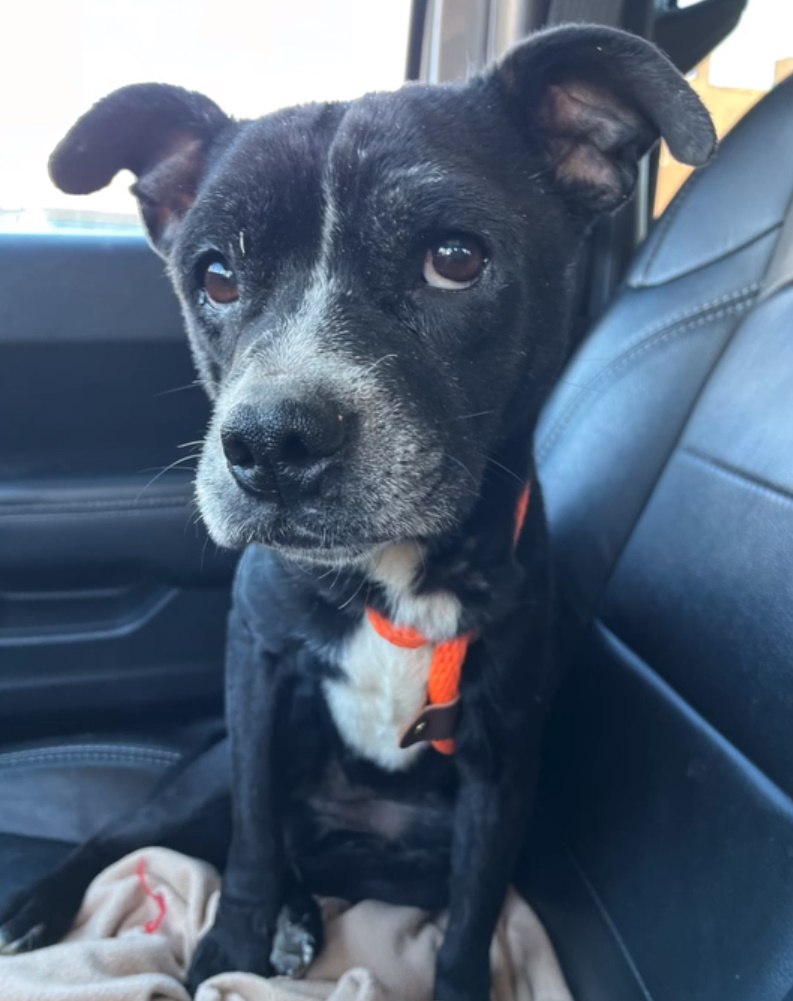Just recently, I started thinking about how dogs were first domesticated over 30,000 years ago and I just can’t overstate how important this event was for humanity, even today.
Yet, despite the fact that they have been at our side for that long, some people still continue to abuse or neglect their pups.
It’s horrible that this bond between a man and a dog doesn’t extend to everyone, but all of that can change if we work hard to fix the issue.
In this story, we will talk about this poor pup who was tied to a cage next to garbage and left on his own until somebody special came to help.
He Lived In Horrible Conditions

When a rescuer from Stray Rescue of St. Louis was made aware of a dog who was living in just awful conditions and needed help, she responded.
She took a while looking for the place but ultimately found it. The place looked horrible. It was some sort of yard filled with all sorts of disposable garbage.
Upon looking further, she saw the dog tied to a cage with some sort of makeshift leash. He was just lying there, frightened.
When the rescuer approached this sweet dog named Harwell, she noticed that he was a bit frightened and confused.

He didn’t know if this person meant well for him, so he was hesitant to approach her. She got close and gave him some food.
After he stood up, she noticed just how skinny he was. Harwell was just 18 pounds and was seriously malnourished. He desperately needed help.
This must have been his first meal in a long time, and it’s just heartbreaking to think of what he must have went through to get to this point.
She Rescued Him Immediately

After that, he started wagging his tail, probably because he realized that his rescuer was there to help him. Who knows when he last felt hope like that.
Now that some trust was developed between the two of them, she untied the horribly-designed leash around his neck and took him in her car.
After that, he was taken back to the shelter in St. Louis, where the kind staff did their best to make sure he recovered and got his weight up.

He will never be alone again, and it’s wonderful to see that there are so many people caring for him.
While we don’t know what happens next for Harwell, we know that his rescuers are searching for somebody to foster him.
I am sure that they are doing everything in their power to make sure that he finds a wonderful family and a forever home.
If you’ve ever shared your snacks with your furry companion, you might want to think twice before tossing them a grape. Dogs, known for their love of treats, have a surprising vulnerability to this seemingly harmless fruit. As a seasoned dog enthusiast, you’re always on the lookout for ways to keep your four-legged friend safe and healthy.
While grapes make for a refreshing snack for humans, they can pose a serious health risk to your canine pal. As someone who values the well-being of your furry family member, it’s essential to be aware of the potential dangers lurking in everyday foods. Stay tuned to discover why grapes can be a perilous choice for your beloved pet’s diet.
Understanding why Grapes are Harmful to Dogs
Grapes, in all forms, are toxic to dogs. It’s best to avoid giving your furry friends any grapes as they can lead to serious health issues.
Toxic Compounds in Grapes
Grapes contain unknown compounds that can cause kidney failure in dogs. These compounds affect canines differently, and even a small amount can be harmful.
Impact on Dogs
After eating grapes, some dogs may show signs of vomiting, diarrhea, or lethargy. These symptoms may appear within hours of consumption and can escalate rapidly.
No Safe Amount
Unlike some foods that may be safe in small quantities, there is no identified safe amount of grapes for dogs. It’s crucial to keep grapes and foods containing them out of reach.
Veterinary Attention
If you suspect your dog has eaten grapes or shows any symptoms, seek immediate veterinary care. Prompt action can help prevent serious complications.
Alternatives to Grapes
Opt for dog-friendly treats like blueberries, apples, or carrots instead of grapes. These alternatives are safe and healthy options for your canine companion.
Remember, being cautious about what your dog consumes is key to ensuring their well-being. Stay informed and keep your furry friend safe from harmful foods like grapes.
Symptoms of Grape Toxicity in Dogs
When it comes to grape toxicity in dogs, it’s crucial to be aware of the potential symptoms that can arise if your furry friend ingests these harmful fruits. Here are some common signs to watch out for:
- Vomiting: If your dog consumes grapes, they might start vomiting shortly after. This is their body’s way of trying to expel the toxic substance.
- Diarrhea: Along with vomiting, diarrhea is another common symptom of grape toxicity in dogs. It can lead to dehydration and further complications.
- Lethargy: Your dog may show signs of weakness, lethargy, or a lack of energy after consuming grapes. This can be distressing and indicate underlying issues.
- Abdominal Pain: Dogs may exhibit abdominal pain or discomfort, which can manifest as restlessness or unusual postures.
- Loss of Appetite: Grape toxicity can also cause a sudden loss of appetite in dogs. If your pup refuses to eat, it could be a red flag.
- Dehydration: Due to vomiting and diarrhea, dogs can quickly become dehydrated. Watch for signs like dry gums, sunken eyes, or excessive thirst.
- Decreased Urination: A decrease in urination frequency or volume can signal kidney problems due to grape ingestion.
If you notice any of these symptoms or suspect that your dog has eaten grapes, seeking immediate veterinary care is crucial to prevent serious complications. Remember, prevention is key, so always keep grapes and grape products out of your dog’s reach to ensure their well-being.
Treatment and Prevention of Grape Toxicity in Dogs
When it comes to grape toxicity in dogs, prompt action is crucial. Let’s look at the treatment and prevention measures to keep your furry friend safe.
Immediate Steps
If your dog ingests grapes or shows symptoms like vomiting, diarrhea, or lethargy, don’t delay. Contact your veterinarian or an animal poison control hotline immediately. Time is of the essence in these situations.
Medical Treatment
Upon receiving professional help, the vet may induce vomiting or perform gastric lavage to eliminate any remaining grapes from your dog’s system. Intravenous fluids could also be administered to support kidney function.
Monitoring and Follow-up
After initial treatment, your dog may need to stay at the veterinary clinic for observation. Follow any post-treatment care instructions diligently to ensure a smooth recovery process.
Prevention Tips
Prevention is key to avoiding grape toxicity incidents. Keep grapes and raisins out of your dog’s reach at all times. Educate yourself about the harmful effects of grapes on dogs to stay vigilant.
Alternative Treats
Opt for safe and healthy snack options like blueberries, apples, or carrots for your canine companion. These treats are not only delicious but also free from potential toxicity risks.
Remember, your dog’s well-being is in your hands. Stay informed, act swiftly, and prioritize preventive measures to safeguard your beloved pet from grape toxicity.
The Risks and Dangers Associated with Feeding Grapes to Dogs
Grapes are one of the most harmful fruits for your furry friend. Even a small amount can be toxic to dogs. They can cause severe kidney damage, leading to kidney failure, which is life-threatening for your pet. It’s crucial to understand the risks involved in feeding grapes to dogs to ensure your pet’s health and well-being.
- Kidney Failure Risk:
Grapes, whether fresh or dried (raisins), contain toxins that can disrupt your dog’s kidney function. The exact substance responsible for this toxicity is not yet identified, making grapes unpredictable and dangerous for dogs. - Symptoms of Grape Toxicity:
If your dog consumes grapes, watch out for symptoms such as vomiting, diarrhea, lethargy, abdominal pain, and decreased urination. These signs may appear within hours of ingestion and could indicate serious health issues. - Immediate Veterinary Care:
If you suspect your dog has eaten grapes, don’t wait for symptoms to worsen. Seek immediate veterinary assistance. Time is critical in treating grape toxicity, and prompt action can make a difference in your pet’s recovery. - Avoiding Grape Ingestion:
Prevention is key. Keep grapes and raisins out of reach of your dog at all times. Be cautious with foods containing grapes, such as certain snacks or baked goods. Remember, it’s better to be safe than sorry when it comes to your pet’s health. - Safer Alternatives:
Instead of grapes, offer your dog safe fruits like blueberries, apples, or carrots as healthy treats. These alternatives provide essential nutrients without posing any risks of toxicity to your beloved canine companion.
Remember, keeping grapes away from your dog is a simple yet crucial step in ensuring they lead a healthy and happy life. Prioritize your pet’s well-being by being mindful of what foods you expose them to.
Conclusion
Remember, grapes can be harmful to your furry friend, potentially leading to serious health issues like kidney failure. If your dog accidentally eats grapes, don’t wait for symptoms to appear; seek immediate veterinary help. Keep grapes out of reach and opt for safer treats like blueberries, apples, or carrots to keep your pet healthy and happy. Stay informed and take proactive steps to ensure your dog’s well-being. Your pet’s safety is a top priority, so be mindful of what you feed them to prevent any grape-related incidents.
Frequently Asked Questions
Are grapes safe for dogs to eat?
No, grapes are not safe for dogs to eat. Grapes can be toxic to dogs and may lead to kidney failure, even in small amounts.
What should I do if my dog eats grapes?
If your dog eats grapes, it’s crucial to seek immediate veterinary care. Prompt action can help prevent severe health issues like kidney failure.
What are the symptoms of grape toxicity in dogs?
Symptoms of grape toxicity in dogs may include vomiting, diarrhea, lack of appetite, and lethargy. Immediate medical attention is necessary if these signs occur.
How can I prevent grape toxicity in dogs?
To prevent grape toxicity in dogs, keep grapes and raisins out of reach. Offer dog-friendly treats like blueberries, apples, and carrots as safer alternatives.
[no_toc]

Hey there, I’m Janet Brooks, a dog-loving student from California. I’m all about helping pups in need, especially those without homes. Me and my awesome friends work together to give shelter and love to stray dogs. Oh, and I also write blogs about dogs to share helpful info.